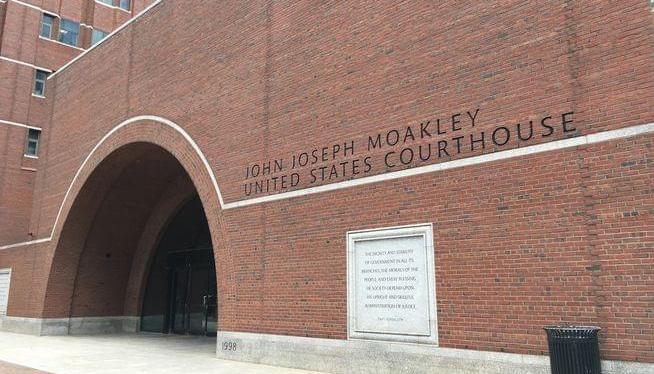
by Frank O’Donnell
Theodore Clement, artist director of Counter-Productions Theatre Company, says that Samuel Beckett’s “Waiting for Godot” is a play “we’ve wanted to produce for some time. I have a great love for absurdism, and this play is the crown jewel of the genre. We were really just waiting for the right director.”
Enter Valerie Remillard, one of CPTC’s resident artists. “I think I literally stopped breathing” when Clement offered her the helm of “Godot” because “it’s a play I’ve always wanted to direct in its full scale. It didn’t take much convincing to get me on board.”
It’s a Thursday night in October, and a small group of actors and crew have gathered in a small fourth-floor classroom at CCRI’s Warwick campus. This is their rehearsal space. They won’t move in to the actual space at AS220’s Black Box Theatre in downtown Providence until the following week.
“They’ll still be calling for lines,” says Remillard, but for the most part, they don’t. She does promise that there will be copious notes at the end of the first act. With that, the actors begin.
Geoff Leatham is Gogo, and Dan Fisher is Didi. They appear to be simple men, one simpler than the other. They are in a park, near a tree, waiting for Godot. A friend, an acquaintance? We never really find out – not in the first act anyway. Gogo is the leader of the two. Didi has a continence problem, and frequently has to find a spot to relieve himself.
Their conversations ramble, and pointedly make no sense. Enter Pozzo (Steven Zailskas) with Lucky (Stevie Smith) in tow on a long rope. Lucky is carrying a picnic basket, and Pozzo snaps his whip to get Lucky to do what he commands. Lucky is mute – but wait, is he? – and Smith expresses himself well with his body language and facial expressions.
When he does speak – vocal thinking, as it is termed – it’s complete nonsense. But so is most of the rest of the show. Remember, absurdism.
“Godot” was Remillard’s “gateway play into existentialism.” But she loves the play because of the relationship between Didi and Gogo. “We have all encountered given circumstances with people and situations in our lives that have made us feel powerless against the day-to-day odds. Terminal illness, addiction, depression, co-dependent relationships, unemployment, any kind of literal or figurative imprisonment.”
For a couple of hours, “we experience two humans leaning on each other as they wait for relief from their circumstances. Relief that never comes. And we get to see their warmth, compassion and support of one another, the hilarious and/or tedious nature of diverting themselves while waiting and their gratitude for distractions that come into their world uninvited.”
When the first act ends, Remillard delivers on her promise, and runs through “copious” notes. The first set goes to Fisher and Leatham. “I’m seeing actory stuff. It’s the first time I’ve actually seen you acting.” She encourages them to go back to the natural way they behaved from the start. “Trust yourselves.”
The first act notes end with a long discussion on how tightly Lucky’s rope should be held. Everyone gets in on it, because that’s how the process works. They finally decide it should be more taut than slack. Sounds trivial – maybe even absurd – but it’s an important consideration, both for the play and also for Smith’s safety. He is, after all, wearing the rope around his neck.
“There is so much courage, truth and hope to this play,” says Remillard. “And we can never have enough of that in art and in life, in my opinion.”

[Counter-Productions Theatre Company presents “Waiting for Godot,” October 20 through 29. For tickets and information, call 401.419.2205 or visit www.cptcri.com.]













